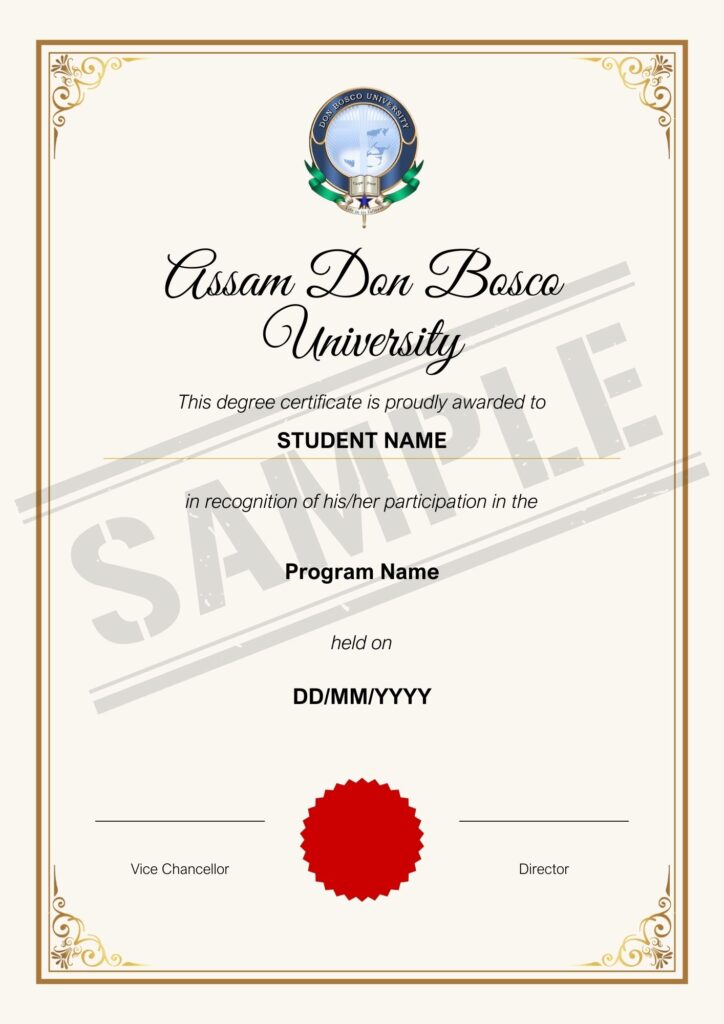Test Program
B.tech in Civil Engineering
Duration: 04 Years
No. of Seats: 60
B.Tech in Civil Engineering
The B.Tech in Civil Engineering at Assam Don Bosco University prepares students to design, construct, and maintain critical infrastructure that shapes the modern world. Through a blend of theoretical knowledge and hands-on experience, the program equips students with the skills needed to tackle challenges in construction, transportation, and environmental engineering. With a curriculum focusing on structural analysis, materials science, and sustainable practices, graduates are prepared to lead projects that address global development needs. The program emphasizes innovation, teamwork, and leadership. Students are mentored by experienced faculty and gain exposure to industry standards and cutting-edge technologies. This program lays the groundwork for future civil engineers to make a tangible impact on society.

Program Highlights and Advantages
Building Expertise for the Future of Infrastructure

Comprehensive Curriculum
Covering key areas such as structures, transportation, and environmental engineering.

Practical Training
Hands-on projects, internships, and site visits for real-world exposure.

Cutting-Edge Labs
State-of-the-art facilities for structural analysis and material testing.

Industry Collaboration
Strong ties with industry partners for internships and placements.
Program Overview & Structure
| Engineering Mathematics I |
| Engineering Chemistry |
| Engineering Physics |
| Communicative English I |
| Basic Electrical Engineering |
| Engineering Mechanics |
| Computer Programming |
| Engineering Chemistry Lab |
| Engineering Physics Lab |
| Computer Programming Lab |
| Engineering Drawing I |
| Workshop Practice I |
| Communication Practice Lab I |
| Engineering Mathematics II |
| Engineering Chemistry |
| Engineering Physics |
| Communicative English |
| Basic Electronics |
| Advanced C and Data Structures |
| Elements of Mechanical and Civil Engineering |
| Engineering Chemistry Lab |
| Engineering Physics Lab |
| Basic Electrical Engineering Lab |
| Engineering Drawing II |
| Advanced C and Data Structures Lab |
| Communication Practice Lab II |
| Engineering Mathematics III |
| Fluid Mechanics |
| Engineering Survey |
| Structural Elements of Building |
| Economics for Engineers |
| Engineering Survey Lab |
| Civil Engineering Drawing I |
| Engineering Mechanics Lab |
| Engineering Mathematics IV |
| Structural Analysis I |
| Hydraulics and Hydraulic Machines |
| Engineering Geology |
| Object Oriented Programming |
| Organisational Behaviour |
| Fluid Mechanics Laboratory |
| Engineering Geology Laboratory and Field Study |
| OOP Lab. |
| Structural Analysis II |
| Design of Structures I |
| Geotechnical Engineering |
| Transportation Engineering I |
| Environmental Engineering I |
| Project Management |
| Geotechnical Engineering Lab |
| Transportation Engineering Lab |
| Mini Project (Special emphasis on Engineering Survey Lab) |
| Structural Analysis III |
| Design of Structures II |
| Foundation Engineering |
| Environmental Engineering II |
| Hydrology and Flood Control |
| Production & Operations Management |
| Concrete Technology Laboratory |
| Environmental Engineering Lab |
| Comprehensive Surveying Camp |
| Estimation and Costing |
| Irrigation Engineering |
| Transportation Engineering II |
| Construction Technology, Planning and Management |
| Electives |
|---|
| Advanced Foundation Engineering |
| Traffic Engineering |
| Concrete Technology |
| Quality Management Systems |
| Major Project I |
| Civil Engineering Drawing II |
| Industry Training Seminar |
| Design of Structure III |
| Electives |
|---|
| Geoinformatics |
| Environmental Geotechniques |
| Watershed Management |
| Earthquake Resistant Design |
| Thoughts that Shape the World |
| Financial Management and Accounting |
| Major Project (Phase II) |
Degree offered by us

Minimum Eligibility Criteria
Passed Higher Secondary School Leaving Examination (or equivalent) with 50% of the aggregate and 50% of the aggregate of Physics, Maths and Chemistry/Computer Science
OR
Passed Diploma (in Engineering and Technology) examination with at least 50% marks (subject to vacancies in the First Year, in case the vacancies at lateral entry are exhausted).
JEE(Mains), any State Entrance Test or the Don Bosco University Graduate Entrance Test
BTech - Honours
Students admitted to a four-year B.Tech degree course will be offered a provision of earning B.Tech with Honours in some emerging areas of the same department. For this, students found to be eligible as per University norms will require to earn a minimum of additional 18 to 20 credits in the specified area in addition to the credits essential for obtaining an Undergraduate Degree in the major discipline (i.e., 160 credits).
BTECH - Lateral Entry
Limited seats are available for direct admission into the third semester of BTech for Diploma Holders from AICTE approved Polytechnics and BSc (PCM) graduates.
Eligibility Criteria
Passed Diploma examination with at least 60% marks in ANY branch of Engineering and Technology
Passed B.Sc. Degree from a recognized University as defined by UGC, with at least 50% marks and passed 10+2 examination with Mathematics as a subject
Career Impact
Empowering Future Leaders in Civil Engineering
Construction Management
Lead large-scale infrastructure projects.
Environmental Engineering
Drive sustainable solutions for environmental challenges.
Structural Design
Design innovative structures for diverse sectors.
Consulting and Research
Advise on civil engineering projects and conduct pioneering research.
F.A.Q.
The university offers a range of undergraduate, graduate, and doctoral programs across disciplines including engineering, science, arts, business, and health sciences. Each program has its own specific requirements and areas of focus.
You can apply online through our university’s admissions portal. Complete the application form, submit the required documents (such as transcripts, test scores, and recommendation letters), and pay the application fee. Detailed instructions are available on our admissions webpage.
Admission requirements vary by program. Typically, undergraduate programs require a high school diploma and specific academic credentials, while graduate programs may require a bachelor’s degree in a related field, relevant test scores, and work experience. Be sure to review the specific requirements for the program to which you are applying.
Yes, the university offers a variety of scholarships and financial aid programs based on academic merit, financial need, and other criteria. Information about available scholarships and how to apply is available on the university’s financial aid webpage.
Application deadlines vary depending on the program and the intake period (e.g., fall, spring). Be sure to check the program’s admissions page for specific deadlines.
